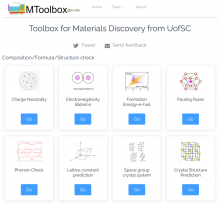 The availability and easy access of large scale experimental and computational materials data have enabled the emergence of accelerated development of algorithms and models for materials property prediction, structure prediction, and generative design of materials. However, lack of user-friendly materials informatics web servers has severely constrained the wide adoption of such tools in the daily practice of materials screening, tinkering, and design space exploration by materials scientists. Herein Dr. Jianjun Hu's team developed http://materialsatlas.org, a web based materials informatics toolbox for materials discovery, which includes a variety of routinely needed tools for exploratory materials discovery, including materials composition and structure check (e.g. for neutrality, electronegativity balance, dynamic stability, Pauling rules), materials property prediction (e.g. band gap, elastic moduli, hardness, thermal conductivity), and search for hypothetical materials, and fool-proof machine learning of user-specified datasets. These user-friendly tools can be freely accessed at http://materialsatlas.org. This materials informatics apps will greatly ease the pains in exploratory materials discovery.
The availability and easy access of large scale experimental and computational materials data have enabled the emergence of accelerated development of algorithms and models for materials property prediction, structure prediction, and generative design of materials. However, lack of user-friendly materials informatics web servers has severely constrained the wide adoption of such tools in the daily practice of materials screening, tinkering, and design space exploration by materials scientists. Herein Dr. Jianjun Hu's team developed http://materialsatlas.org, a web based materials informatics toolbox for materials discovery, which includes a variety of routinely needed tools for exploratory materials discovery, including materials composition and structure check (e.g. for neutrality, electronegativity balance, dynamic stability, Pauling rules), materials property prediction (e.g. band gap, elastic moduli, hardness, thermal conductivity), and search for hypothetical materials, and fool-proof machine learning of user-specified datasets. These user-friendly tools can be freely accessed at http://materialsatlas.org. This materials informatics apps will greatly ease the pains in exploratory materials discovery.